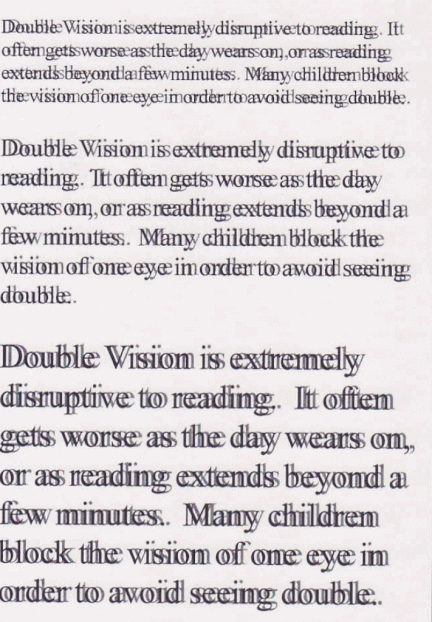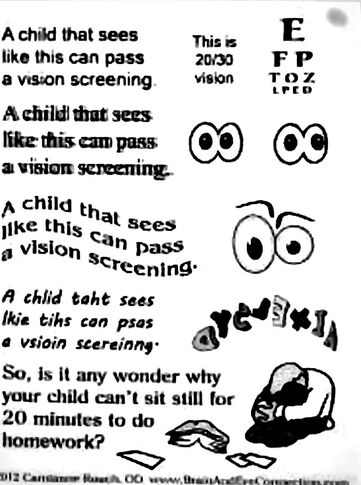|
What is Vision Therapy?
Optometric vision therapy, sometimes called visual training or VT, is the part of optometric care devoted to developing, improving and enhancing people’s visual performance. Vision therapy can benefit people of all ages. Over several decades, behavioral optometrists have developed and used vision therapy – in combination with appropriate, judiciously selected lenses to:
Through vision therapy, people are able to develop more efficient visual performance. Visual Skills/Visual Stress If an individual’s visual skills are not adequately developed, or a person fails to coordinate vision with other senses, vision problems may occur. |
With poor binocularity, for example, one eye may locate an object in one place while the other eye locates it in another. The confusing signals may result in:
Beyond Visual Performance
Vision Therapy also has proven to be a remarkably effective tool in helping people with learning-related visual problems. Many problems in learning to read and write are made worse by poorly developed visual skills.
Dozens of experimental programs involving thousands of children and adults demonstrate that when visual skills are enhanced through vision therapy, learning is easier, reading levels rise, and in some cases, IQ scores have increased.
Success at Carolina Vision Development
We have seen the benefits of Vision Therapy first hand in our office. Children who once had to be removed from their classroom for specialized reading, are now able to learn along with their peers. A young swimmer who could not swim in a straight line is now thriving on her schools swim team. A 10 year old boy who could not ride a bike is able to after completing his program of care.
Each child, teenager, and adult that we work with at Carolina Vision Development have their own special success story.
Accommodative Dysfunction
Accommodative Dysfunction is an eye focusing problem. This is an inability to adjust the focus of the eyes to see objects at different distances. It includes problems looking from the board to a book or looking up from the paper to the teacher. Another aspect of this is the ability to focus and keep the words clear continuously. This is particularly important in reading for extended periods of time. Due to increased digital device usage, many adults suffer from this along with children. Focusing problems generally are not muscle problems. The focusing muscles in a child are strong enough to adjust focus, yet the ability still can malfunction. The reason for this lost ability is a breakdown in the control of focusing. The focus gets “stuck” at one distance and can’t adjust to the next. This becomes evident during reading and computer work. Sports and outdoor activities rarely contribute to accommodation problems. Prolonged reading and computer work can contribute to this form of eye strain. Note that as the focusing system breaks down, other vision problems begin to appear, resulting in poor school or work performance.
Symptoms of Accommodative Dysfunction:
Further testing should be done by an Optometrist to diagnose the condition. Vision Therapy would be required when the symptoms are severe enough. The eye exercises done in vision therapy re-train the person to adjust their vision in a relaxed way and to see comfortably again.
Convergence Insufficiency
Convergence Insufficiency is an eye coordination disorder in which the eyes do not adjust to near vision easily. It is an eye teaming problem where the eyes cannot converge (cross) enough to see something close without seeing double or closing one eye. The condition may go unnoticed by the person or parents because they often make compensations for the condition so it will no longer bother them. To prevent double vision, the individual exerts effort to make the eyes converge (point up close). This extra effort can lead to a number of frustration symptoms that interfere with the ability to read smoothly and can cause schoolwork to suffer or become erratic.
Symptoms of Convergence Insufficiency:
These symptoms may also be from other problems like study techniques. It is important to have a full testing for convergence insufficiency to determine the real cause. It is not usual for people with convergence insufficiency to cover or close one eye while reading to relieve the blurring and double vision. Symptoms will be worsened by illness, lack of sleep, stress or prolonged close work. The person may not complain of double vision or other symptoms listed above because vision in one eye has shut down. This type of adaptation is called suppression. In other words, even though both eyes are open, healthy and capable of sight, the person could ignore one to avoid double vision. Suppression of vision in one eye causes loss of binocular (two-eyed) vision and depth perception. Poor binocular vision can have a negative impact on many areas of life such as handwriting, sports and judging distance.
A person with convergence insufficiency who is suppressing one eye can show some of the following symptoms:
- Headaches. Especially near the eyes or forehead, or occasionally at the back of the head.
- Double Vision. Two objects are seen when only one exists.
- Reduced Performance. Losing your place while reading, rereading words or lines, difficulty with understanding or recalling what you’ve read, reading slowly.
- Discomfort, Fatique. Body tension, stress or pain; weariness at the end of a school or work day.
- Suppression. Information from one eye may be blocked or ignored to avoid seeing double. If the visual problem is not corrected, it may get worse.
Beyond Visual Performance
Vision Therapy also has proven to be a remarkably effective tool in helping people with learning-related visual problems. Many problems in learning to read and write are made worse by poorly developed visual skills.
Dozens of experimental programs involving thousands of children and adults demonstrate that when visual skills are enhanced through vision therapy, learning is easier, reading levels rise, and in some cases, IQ scores have increased.
Success at Carolina Vision Development
We have seen the benefits of Vision Therapy first hand in our office. Children who once had to be removed from their classroom for specialized reading, are now able to learn along with their peers. A young swimmer who could not swim in a straight line is now thriving on her schools swim team. A 10 year old boy who could not ride a bike is able to after completing his program of care.
Each child, teenager, and adult that we work with at Carolina Vision Development have their own special success story.
Accommodative Dysfunction
Accommodative Dysfunction is an eye focusing problem. This is an inability to adjust the focus of the eyes to see objects at different distances. It includes problems looking from the board to a book or looking up from the paper to the teacher. Another aspect of this is the ability to focus and keep the words clear continuously. This is particularly important in reading for extended periods of time. Due to increased digital device usage, many adults suffer from this along with children. Focusing problems generally are not muscle problems. The focusing muscles in a child are strong enough to adjust focus, yet the ability still can malfunction. The reason for this lost ability is a breakdown in the control of focusing. The focus gets “stuck” at one distance and can’t adjust to the next. This becomes evident during reading and computer work. Sports and outdoor activities rarely contribute to accommodation problems. Prolonged reading and computer work can contribute to this form of eye strain. Note that as the focusing system breaks down, other vision problems begin to appear, resulting in poor school or work performance.
Symptoms of Accommodative Dysfunction:
- Visual discomfort, pain, red or sore eyes
- Difficulty sustaining near visual concentration
- Avoiding reading or writing
- Fatigue
- Sensitivity to glare and lights
- Double vision when reading
- Holding a book close or pushing it back in order to adjust the focus
- Blurred vision or dizziness after looking up from reading
Further testing should be done by an Optometrist to diagnose the condition. Vision Therapy would be required when the symptoms are severe enough. The eye exercises done in vision therapy re-train the person to adjust their vision in a relaxed way and to see comfortably again.
Convergence Insufficiency
Convergence Insufficiency is an eye coordination disorder in which the eyes do not adjust to near vision easily. It is an eye teaming problem where the eyes cannot converge (cross) enough to see something close without seeing double or closing one eye. The condition may go unnoticed by the person or parents because they often make compensations for the condition so it will no longer bother them. To prevent double vision, the individual exerts effort to make the eyes converge (point up close). This extra effort can lead to a number of frustration symptoms that interfere with the ability to read smoothly and can cause schoolwork to suffer or become erratic.
Symptoms of Convergence Insufficiency:
- Eyestrain and discomfort
- Double vision or shadows on words
- Headaches
- Inability to concentrate
- Shortened attention span
- Frequently loses place while reading
- Rubbing, closing or covering an eye
- Putting head down while reading or writing
- Trouble remembering what was just read
- Words move, jump or swim on the page
These symptoms may also be from other problems like study techniques. It is important to have a full testing for convergence insufficiency to determine the real cause. It is not usual for people with convergence insufficiency to cover or close one eye while reading to relieve the blurring and double vision. Symptoms will be worsened by illness, lack of sleep, stress or prolonged close work. The person may not complain of double vision or other symptoms listed above because vision in one eye has shut down. This type of adaptation is called suppression. In other words, even though both eyes are open, healthy and capable of sight, the person could ignore one to avoid double vision. Suppression of vision in one eye causes loss of binocular (two-eyed) vision and depth perception. Poor binocular vision can have a negative impact on many areas of life such as handwriting, sports and judging distance.
A person with convergence insufficiency who is suppressing one eye can show some of the following symptoms:
- Trouble catching a ball and other objects thrown though the air
- Avoids tasks that require depth perception like baseball and tennis
- Spills or knocks over things
- Bumps into doors and chairs
- Sports, bicycle or car parking accidents
- Tilts head or turns head to see
- Problems with motion sickness or vertigo

